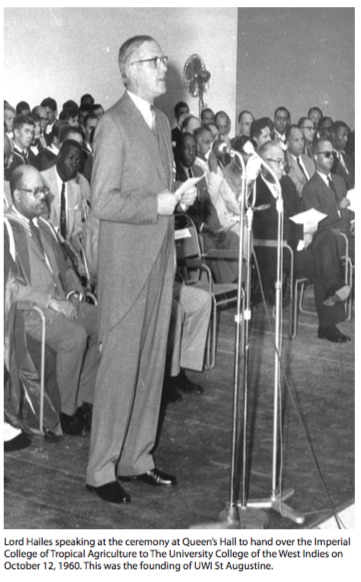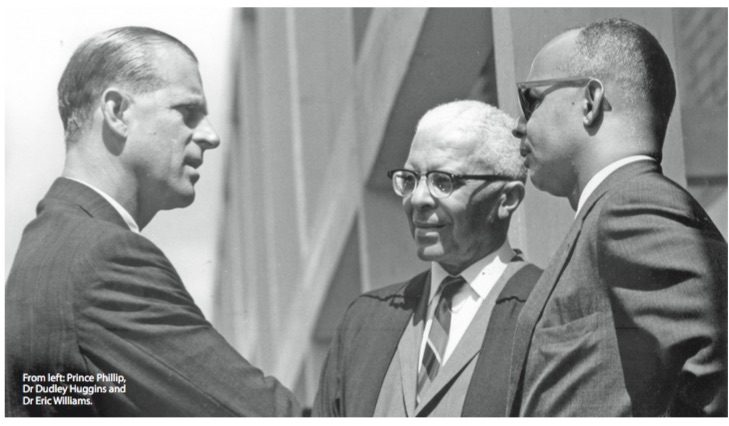
On 12 October 1960, a marriage of sorts was celebrated at the brand new Queen’s Hall in Port of Spain. The ceremony was the final handover of The Imperial College of Tropical Agriculture (ICTA) to The University College of the West Indies (UCWI). ICTA, which had opened its doors to students in 1922, ceased to exist; its staff, students, assets and programmes were handed over to UCWI (which had first accepted students at Mona, Jamaica, in 1948), becoming its second campus.

At this ceremony, attended by notables such as the governor-general of the Federation of The West Indies and the governor and premier of Trinidad and Tobago, the speech of the day was made by Arthur Lewis, Principal of UCWI (he would become the first vice-chancellor of The University of the West Indies [UWI] in 1962). He said it was a boy of 12 marrying a mature lady of 40; the boy must be willing to learn and the lady to tolerate.... More seriously, Lewis described ICTA as “a great centre of teaching and research” in tropical agriculture. This “great centre” now became UCWI’s Faculty of Agriculture, the first faculty at the St Augustine campus which came into existence at the Queen’s Hall ceremony. Fittingly, its first principal was the “Father of UWI”, the Jamaican Philip Sherlock, who came from Mona, where he was Vice-Principal, to lead the new campus.
Why had ICTA agreed to its own demise through its merging with a much newer institution situated in far- away Jamaica? ICTA had many weaknesses. First, it was a foreign, British, colonial college, whose main purpose was to train men for jobs in the agricultural services of the empire. This, of course, made it increasingly irrelevant as the formal empire gradually disappeared, as well as politically unacceptable to leaders like Eric Williams of Trinidad and Tobago and Norman Manley of Jamaica. It had minimal links to its host country and to the English-speaking Caribbean in general. Its student numbers had always been small, well under 100 in most years. Above all, it did not grant degrees, only diplomas which lacked the status of a BSc, and was therefore not a first choice for ambitious West Indian school-leavers, nor could it establish partnerships with universities in Britain or elsewhere. Its strength was its international reputation for high-level research; its teaching and research staff, such as Fred Hardy; a fine specialist library; and its physical assets at St Augustine (many buildings, including the iconic “Admin Building”, laboratories, an experimental sugar factory, and an extensive farm).
Discussions between ICTA and UCWI took place, on and off, for much of the 1950s, dragging on in typically academic fashion. The deadlock was broken by two strong-willed leaders: UCWI’s Lewis, backed by Premier Williams; and Jock Campbell of Booker- McConnell (the UK and Guyana-based company responsible for the Booker Prize), who became chair of ICTA’s Board in 1957. He saw the inevitable, and urged on negotiations leading to the winding-down of ICTA and the transfer of all its assets, and of its staff who agreed, to UCWI.

When the St Augustine campus of UCWI began its life in October 1960, it possessed one faculty and 67 students, registered for the new BSc in Agriculture or pursuing ICTA’s postgraduate programmes. But at the Queen’s Hall ceremony, Williams had made it clear that his government intended to fund a Faculty of Engineering as soon as possible. With assistance from UNESCO, the Ford Foundation and universities in Britain, Canada and the USA, the new Faculty accepted its first cohort of 28 students in October 1961. St Augustine was now a two-faculty campus, but student enrollment was minuscule, and relatively few were nationals of the host country; since the Mona campus did not offer degrees in agriculture or engineering, many came from the other territories served by UCWI.
This situation was transformed in October 1963. What was then called the College of Arts and Sciences (CAS) began to teach for degrees in the humanities and the social and natural sciences, duplicating programmes long taught at Mona. From the start, the men and women reading for these degrees were overwhelmingly nationals of the host nation; it was only with the CAS that large numbers of Trinbagonians came to St Augustine as students. There was a significant backlog of local aspirants for degrees, most of whom opted for humanities courses; many were mature people, teachers and civil servants, who took advantage of evening classes for Year 1 students. It was in 1963, with the opening of the CAS, that St Augustine first began to have a wide impact on the host society, transforming the scope of local educational opportunities. Immediately, enrollment in the CAS outstripped that in Agriculture and Engineering. In 1966, 80 nationals of Trinidad and Tobago from that first 1963 cohort graduated with the BA, only slightly fewer than all the nationals who had obtained the BA at Mona between 1953 and 1964. Graduates in the natural sciences also increased dramatically from 1966.
In 1962, UCWI had been replaced by UWI, as the university gained its “independence” from the University of London with which UCWI had been affiliated, and gained the right to award its own degrees. Along with the dramatic opening up of the campus with the CAS in the following year, the St Augustine campus was set on the path of sustained expansion—in course offerings, programmes, faculties, institutes, students, staff and physical assets—which it would follow in the decades to come.